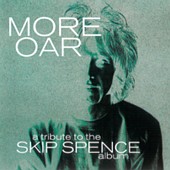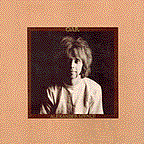
VARIOUS
ARTISTS
More
Oar

A
Tribute to the
Alexander
'Skip' Spence Album
(Jericho
CD)
If you're unfamiliar
with the recording entitled 'Oar' by the late
Alexander 'Skip Spence, formerly of Jefferson
Airplane and Moby Grape, Sundazed Records have seen
fit to reissue the original Columbia LP material from
1969 on CD with ten extra tracks. Suffice to say
there has not, in my not especially humble opinion,
been a finer compact disc release thus far. All of
you who do not possess it should firstly remedy that
basic error of judgement and then buy this CD as
well, for three reasons. Firstly, proceeds from sales
go direct to the Spence family; it may be that Skip's
hospital bills have not yet been met in full. (He
died on April 16th this year of pneumonia
with added complications, having lived in residential
care houses and other state institutions for most of
the past twenty years.) Secondly, 'More Oar'
is a fitting tribute to the man and his music and a
fine recording in its own right. Here's why.
(N.B. I had
originally planned to embark upon a side-by-side dual
review of the two records for the benefit of the
utterly uninitiated but abandoned this project before
it even got off the ground on the grounds that it
would take too long; there was the fear that I'd end
up selling both records short. Instead I'm content
merely to allude intermittently as to what extent
each cover version attempts to
emulate/deconstruct/ignore the original song, thereby
assuming, rightly or wrongly, a passing familiarity
with the original on the part of you, the reader. Now
read on.)
Robert Plant, a
longtime admirer of Spence and 'Oar', kicks
off proceedings with his version of 'Little Hands',
resplendent with vibes, string bass and acoustic
guitar. The vocal is thoughtful, emotive and
understated, as is the arrangement. Did I really
write that? Robert Plant is one of my least favourite
singers ever, yet this is a fine version. Reputedly
Plant was instrumental in this release's inception
and in the Spence family receiving royalties from it;
he and Skip were photographed together for 'Rolling
Stone'.
It's official; he is
'all right in my book'. Another member of the
(comparatively) 'old guard', Tom Waits, offers a
rousing solo version of 'Books Of Moses', acoustic
guitar and maracas backing up a ferocious Old
Testament prophet type vocal. Lovely dry sound
complements a basic yet well considered arrangement.
Again, I never had much time for Tom Waits before,
but this'll do nicely. But of the elder statesmen's'
offerings, the high point is surely the Durocs'
gorgeous transmogrification of 'Margaret - Tiger
Rug', replete as it is with calliope-like sounds,
trombone, music boxes and cheesy jazz drumming. I'm
assuming the Ron Nagle who constitutes 50% of this
combo is the same gent who fronted the Mystery Trend
back in the Summer of Haight. (Answers on a postcard,
please.) Whatever, this is a fabulous
reworking; I really think Skippy would have
appreciated this one.
It's a fitting
tribute to the stylistic breadth of the original LP
that 'More Oar' runs such a large gamut of
musical styles. Engine 54, whoever they are,
contribute a slack and frothy reggae version of 'It's
The Best Thing For You' that seems totally
appropriate somehow. Again, I suspect this would have
put a big smile on the composer's face. Greg Dulli
gives 'Dixie Peach Promenade' a poppier slant
to good if unenterprising effect whilst Beck does
what Beck does to 'Halo Of Gold', spraying
keyboard samples and squidgy fuzz bass all over the
shop. Jury's still out on Beck in general for me, but
mustard's cut here. As 'tis by Alejandro Escovedo,
whoever he is (yawn) whose version of 'Diana'
boasts a gorgeous sickly tremolo guitar and great
strings. The Ophelias growl their way through a
slapstick 'Lawrence Of Euphoria' and
Mudhoney's sardonic primeval take on 'War In
Peace' takes on extra potency with repeated
plays; their incorporation of Jack Bruce's infamous
seven note motif that is 'Sunshine Of Your
Love' as per Skip towards the end made me laugh
out loud. On the more, um, er, psychedelic' side of
things, the Minus 5 with Peter Buck's version of 'Doodle'
(aka 'Giving Up Things) is pleasantly trippy if
somewhat inconsequential, but both Bristol's Flying
Saucer Attack and New Zealand's Alistair Galbraith
deliver more than adequately with ethereal yet
substantial renditions of ' Grey/Afro' and '
This Time He Has Come' respectively, in each case
evoking the cosmic frailty of the original version.
The remaining tracks
tend to take more of a lead from the versions they
cover than elsewhere; perhaps this is the reason
that, on the whole, they work less well to these
ears. Perhaps it isn't. However, the potency of the
vocal performances of both Jay Farrar on 'Weighted
Down' and Mark Lanegan on 'Cripple Creek'
cannot be denied; the backing still adds little to
the original in each case for me. Ditto Outrageous
Cherry's take on 'Keep Everything Under Your Hat',
though like the aforementioned brace it stands up as
a good performance of a great song; nothing more
though, there's the rub. Taking source as blueprint
works far more effectively in the case of Diesel Park
West with their beautiful rendering of 'All Come
To Meet Her', dripping with heart and soul and
resplendent with chiming dual guitars reminiscent of
the Grape themselves. Which leaves just Robyn
Hitchcock and his take on 'Broken Heart'. Performed
solo, probably live in the studio, he uses a lovely
open guitar tuning and sings in that funny voice of
his. The deadpan delivery of those wonderful lyrics
in a nasal Cambridge drawl throws me every time. As
with Beck though, on balance justice is done.
All in all a great
disc that stands up on its own merits without a duff
track to its name. The strengths of the original
songs are consistently re-emphasized regardless of
the nature of the cover; surely the bottom-line when
determining the value of a 'tribute' record such as
this. I can't emphasize strongly enough how much you
need the original 'Oar' if you don't already
have it, and not just for comparative purposes with
regard to the matter at hand here. Just go out and
buy them both. Oh, and I hadn't forgotten; the third
reason why 'More Oar' is worthy of your
attention and purchase is the inclusion of one track
as yet unmentioned here. Almost ten minutes after the
Minus 5 fade out, a throaty chuckle breaks through
the ether and suddenly swirling spinning guitars, a
double-edged sword of a bass guitar and sensuous
tablas erupt through the speakers. The icing on the
cake is a mysterious guttural spoken bass-baritone
vocal. And wouldn't you just know it - it's the lad
himself, aided and abetted by his old mucker from the
Airplane Jack Casady on the aforementioned bass, with
what was presumably his final studio effort, recorded
in 1994 and submitted for consideration for "Songs
In The Key Of X", the soundtrack to the X-Files
motion picture, but not included. Without wishing
any disrespect to the artists and their efforts
previously chronicled here, "Land Of The
Sun" effortlessly eclipses all that went
before it; a miasmic mantra of sound that looms
ominously, hanging in the air like some hovering bird
of prey for three or four minutes, then fades, is
gone. "Here…in the land of the sun/All
my work…is done" intones Alexander Lee
'Skip' Spence, an eerie epitaph for one of the great
free spirits of our time. His music lives on among us
forever.
If 'More Oar's
existence helps to introduce even a handful of folk
to its wonders, then its conception will have been
more than justified.
Jake Nagle